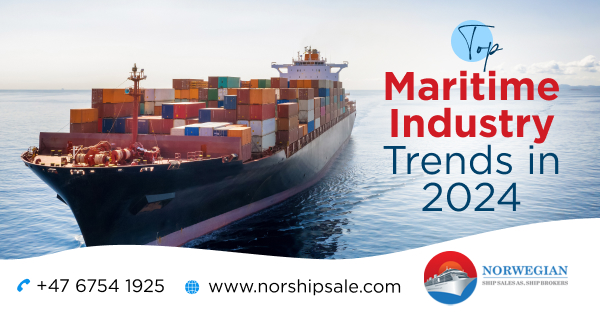In 2024, ship investors interested in the Norwegian market will have numerous opportunities to explore as the maritime industry evolves. Staying ahead of emerging trends is crucial for these investors to maximise their investments. Hence, let’s explore the latest developments in the maritime industry for 2024, with a focus on lucrative opportunities regarding ship sales in Norway.
Take a Look at the Top Trends in 2024
Sustainability:
Sustainability is now an important issue in the maritime sector because there are more rules about the environment and people know more about climate change. People who want to buy ships for sale in Norway should think about choosing ships that have eco-friendly features such as systems to clean exhaust gases, treat ballast water, and designs that save energy. Moreover, the number of investors seeking ships powered by wind and solar energy or other fuels, like LNG, liquified natural gas, and biofuels, is increasing. Putting money into these eco-friendly ships fits with goals to protect nature, follow new rules, and make sure the fleet stays useful for a long time.
Digitalization:
The maritime industry is experiencing a transformation through digital technology, changing the usual ways of working. This transition opens up a vista for many advantages, such as better effective safety, increased safety, and enhanced choices in decision-making. People who invest in ships ought to look for ones that have modern digital technologies, like intelligent sensors, tools that can predict when maintenance is needed, and systems for analysing data. These kinds of technologies allow you to monitor the ship’s performance, fix things before they break down completely and make better use of fuel. By using these methods, you can save money and be more successful than others in the shipping industry. To stay ahead and protect investments for the future in the changing world of maritime, it is important to accept and use digital technology.
Autonomous Vessels:
Self-driving ships are the new big thing in the marine industry, and they could change how we move things over oceans. Right now, these self-piloting boats are still in the testing phase, but there’s a lot of advancement happening with technology, as these ships will be smart enough to avoid collisions as they are equipped with collision avoidance systems, automated docking, and remote monitoring capabilities. Investors in ships must stay updated on the progress of self-operating technology and think about putting money into ships that have autonomous characteristics. These types of vessels can provide advantages such as better safety, lower costs for running them, and improved planning for navigation. The broad acceptance of self-directing ships might be some years in the future, yet putting money into this game-changing technology early can put investors at an advantage in the competitive marine trade industry.
Alternative Fuels:
As the maritime sector aims to cut down on carbon emissions and meet emission rules, there is an increasing focus on different types of fuels other than the usual bunker fuels. LNG is becoming a favourite option because it releases fewer sulphur oxides and particles when burned compared to traditional fuels. Furthermore, hydrogen and ammonia are becoming popular as possible fuels that don’t emit pollutants for what comes ahead. Those who are planning to invest in ships for sale in Norway ought to evaluate if there is enough supply and infrastructure for these different kinds of fuel in the markets they are interested in, along with whether or not their ships can work well with systems that use other kinds of fuel. Investing in ships that run on different types of fuel can reduce harm to the environment and also prepare ship collections for strict future rules and changing fuel prices.
Global Trade Dynamics:
Worldwide trading patterns are impacted heavily by political decisions and trade deals between countries, which change the need for sea transport services. Shifts in trade routes, trade tensions, and geopolitical risks can affect shipping volumes, freight rates, and vessel demand. Investors in the shipping business must pay careful attention to political events worldwide and think about what these could mean for the marine transport sector, especially in important trading places such as Norway. Knowing how trade works around the world helps investors predict changes in the market, identify strategic opportunities, and use their resources best to increase their investment profits.
Conclusion
People who want to invest in ships for sale in Norway and are looking at the ones available in Norway should understand that it’s very important to ensure that the vessel is sustainable, equipped with digital technology, using eco-friendly fuels that do not harm the environment as much, and make sure to learn how worldwide trade works. If they make their investments following these main points of change, they will be in a position to deal with changes in marine industry. Plus, can take advantage of upcoming opportunities and make sure their investment is worthy in the long run.


